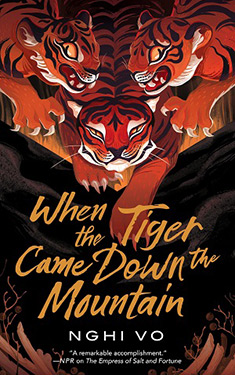Nghi Vo
Completed 6/4/2023, Reviewed 6/4/2023
4 stars
I was so glad this second novella wasn’t as complexly constructed as the first. I thoroughly enjoyed this one. I understood a few more things about the cleric, Chih, too. The prose is wonderful and the story within the story was fascinating as it was told from two perspectives. This one has talking and shapeshifting tigers and a mammoth that the main characters ride through the mountains. It’s a little like A Thousand and One Nights, but unique in its pseudo-Chinese setting and magical elements.
Chih, the non-binary cleric, continues on their journey to collect the history of the region from the stories of people. They need to get over a pass. Their guide over the pass is Si-Yu, a woman with a lance and a mammoth. The journey should only take two days if a storm doesn’t come in early. When they get near the way station they find a naked woman over the body of a near-dead man. Si-Yu and Chih rush to save the man, chasing the naked woman away. Suddenly, they are chased by three tigers and hide in a barn. The tigers, of course, can talk and change into women. But as tigers, they want to eat our companions. Chih makes a deal with the tigers to tell them his version of the story of the love between a famous tiger, Ho Thi Thao, and the scholar Dieu. It is a delay tactic in hopes they will be rescued by Si-Yu’s mammoth riding people. But also, it is an opportunity for Chih to get the tiger’s perspective of this story. The tigers agree but warn that if the story is very wrong, the deal is off.
Chih is a little more fleshed out in this tale, where they are the narrator and primary negotiator with the tigers. Si-Yu, not as much, but through her comments, we get some insight into the mammoth riding culture of the north. Then in the story within the story, Ho Thi Thao and Dieu are very well developed. One of the things I liked the best was the differences between Chih’s version of the story and the tiger’s version. At times the differences are subtle, but they emphasize what is important to humans vs. tigers. I also liked it is that it is a thinly veiled allegory of two women in love.
I give this book four stars out of five. I found it much more accessible than The Empress of Salt and Fortune. The slow-burn romance between Ho Thi Thao and Dieu was engrossing. And the tension between Chih and the tigers wanting to eat them is riveting. Now on to the third book in the series…

No comments:
Post a Comment